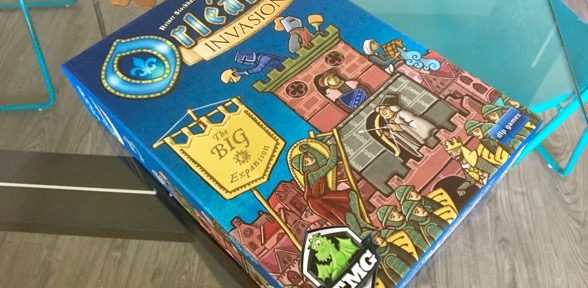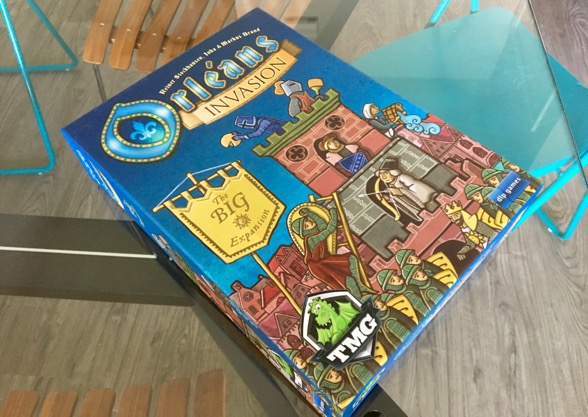Life is a mixed bag — or so the expression goes. I think. Is it an expression? Someone has surely said it. Either way, very few board games literalize the idea of a mixed bag like Orléans, a nifty title from 2015 that has players actually pulling tokens from a soft pouch in the hopes of garnering influence and prestige in Medieval France. Rumor has it this is an accurate representation of how Charlemagne himself ruled Gaul.
Anyhoo, I wrote a warm review of Orléans last year, extolling the game’s use of the “bag-building” mechanic. The whole experience was like a fresh croissant: delicate, flakey, and full of butter. Actually, no. That’s just a description of a croissant. BUT, much like a fresh croissant, Orléans eventually grew a bit stale for me. Don’t get me wrong: I continue to play it (and yes, I would still eat a stale croissant too), but the magic has faded. I blame part of this on my friend Guy — who’s French, incidentally — because he loves Orléans so much that we wound up playing it, like, 1,000 times in one week. I’m afraid one can only eat so many croissants.
What I came to realize about Orléans was that the decisions weren’t always terribly interesting to me after a while. Even with some of the variants proposed in the game and online, I found myself wafting towards the same strategies over and over again, and while I concede that this is a Ben problem, not a game problem, I would also like to concede that it’s sort of a game problem too. Orléans, while pleasant, is sort of a “samey” experience for me. It lacks some of the tense choices that a potentially “samey” game like Concordia or Railways of the World offer. Sure, there are rounds where you pull a bunch of crappy tokens out of the bag, and you have to figure out a way to make the most of what you’ve got, but there’s rarely a sense of urgency in Orléans. If you don’t do something this round, you’ll just do it some other time. And if you don’t do it, then, well, that’s usually okay too. A “beneficial deeds” board sometimes creates a bottleneck of opportunities, and game events gently needle players with annoyances, but Orléans never puts its players’ feet to the fire. More like a space heater turned on low.
With its flaws exposed, could I ever truly embrace Orléans again? Perhaps. A new, kind-of-huge expansion called Orléans: Invasion promises to breathe new life into the game, and thankfully the good people of Tasty Minstrel Games sent me a copy to review. This, of course, begs an immediate question: should people drop the extra $$ on this expansion? And does it reinvigorate, or even improve, Orléans? Answers after the jump.
Most board game expansions offer “more” and “new.” For example, new maps, new pieces, new cards, new actions to carry out, etc. However, the inherent flow, goals, and nature of the base game remain generally the same. Orléans: Invasion is different. It takes Orléans and doesn’t just expand it, but reimagines the game in a variety of ways. Six, to be specific. That’s right: for all you fools complaining about samey-ness (ie. me), this box comes with six modules that upend everything — or most things — we know about Orléans.
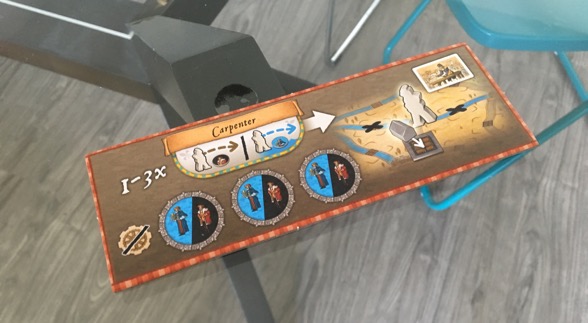
A new Carpenter action for use with the “Prosperity” module.
The most radical departure is the “Invasion” mode, which rebrands the game as a cooperative experience with players working together to fend off unseen invaders at the city gates. Two other modes, “The Duel” and “Prosperity,” hem closer to the original rules of the game but still introduce new boards, concepts, and setups.
Lastly, Invasion comes with three solo modes, which to be honest, I didn’t play because sometimes playing games alone makes me feel sad (and yes, I’ve played games alone more than I’d like to admit).
I’ll be straight up about this: I only played the “Invasion” and “Duel” scenarios, but I felt that was more than enough for me to make an opinion about this expansion.
Does Invasion reinvigorate Orléans? Yes.
Is it worth the money? Yes.
Phew, I’m glad I got that out of the way.
Let me tell you a little bit about the two modes and why they work so well.
“Invasion” is arguably this expansion’s most famous scenario. Heck, they even named the whole box after it. Reimagining the game as a cooperative experience is actually low-key genius. Not only does it directly address a common complaint about the base game (people feel like it’s basically multi-player solitaire), but it tightens up the gameplay massively. Suddenly, every decision matters, and punishing, unpredictable events keep players from gravitating towards the same rote strategies time and time again.

Apparently hurling cheese wheels and brandishing wine bottles were popular defensive tactics in Medieval France.
Essentially, players are burdened with a seemingly endless avalanche of objectives to fulfill: send a bajillion knights to the city, collect an insurmountable number of citizen tiles, hand over dollar after dollar after dollar. It all seems virtually impossible to do, but like most good cooperative games, it’s shocking how close you’ll often get. Adding another layer of stress to this is that each player has an individual objective to achieve, and if anyone at the table fails, everyone fails. Ugh.
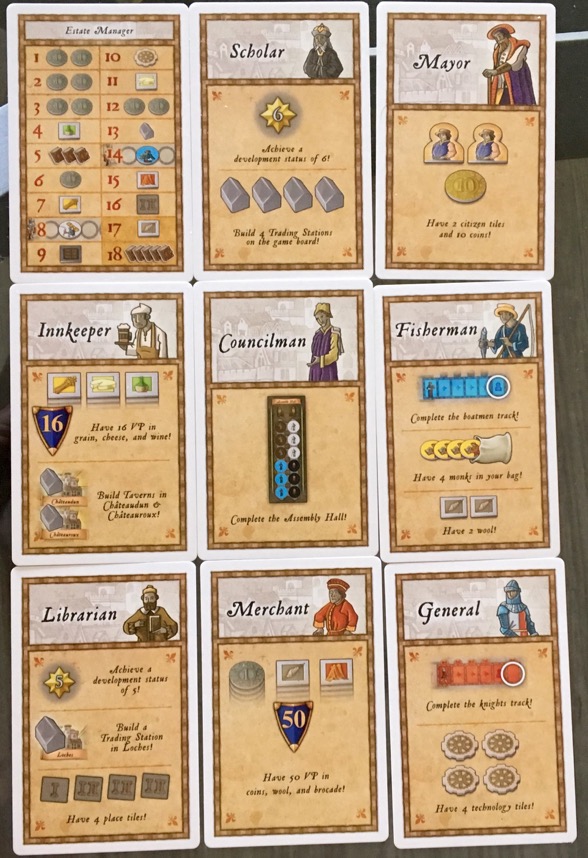
Various personal objections that must be fulfilled, lest you ruin the game for EVERYONE.
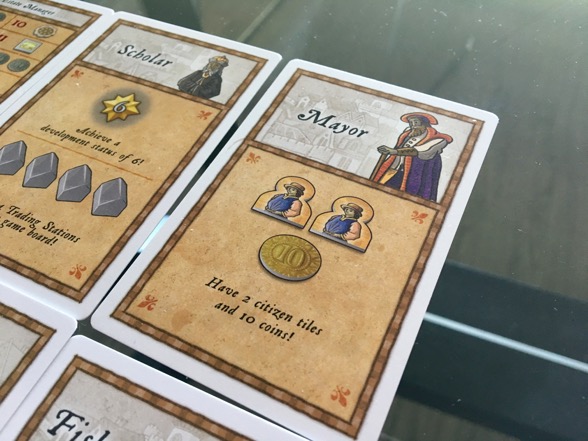
In a recent game I was the Mayor, which made me feel authoritative and cool… until I realized the simple goal of earning $10 and two citizen tiles was much harder than it looked.
Here’s what I like about this. First, I have an inherent bias towards cooperative games as they often generate exciting, memorable social experiences (unless someone is a dick, but I don’t play with people like that). Second, this mode truly tightens up the game. You don’t just want to pull a farmer from your bag (a.k.a. the white token), you NEED to pull the farmer. And if you don’t, you may not be able to execute the action you need, and if you don’t do that, you’re at best debilitated and at worst a failure. Usually you’re a failure. Now those are some stakes. Luckily, some new action spaces keep your head just barely above water. Barely.
Once you do pull out your little tokens (“followers,” in the game parlance), there’s then the new decision of where to employ them. Maybe you want to go to the castle as per your carefully considered plan, but a new event has turned up, and now you must focus elsewhere. What to do? Stick to the longterm plan or deal with the short term problem? Dilemmas! What a lovely concept.

Two new boards for the “Invasion” scenario. So colorful. So stressful.
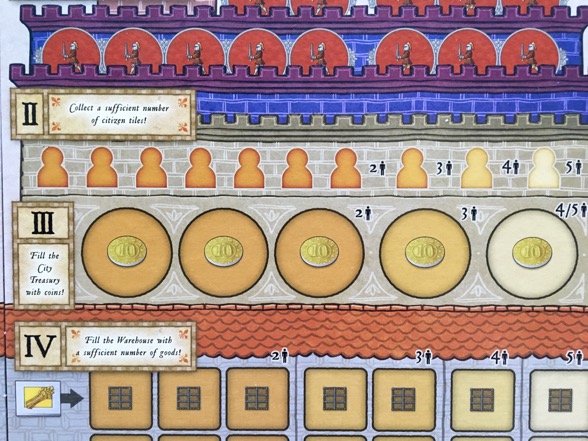
A new board featuring some of the objectives one must complete to win. Not only is it very challenging, but my group accidentally played the hard variant for our first attempt. Needless to say, we were easily INVADED.
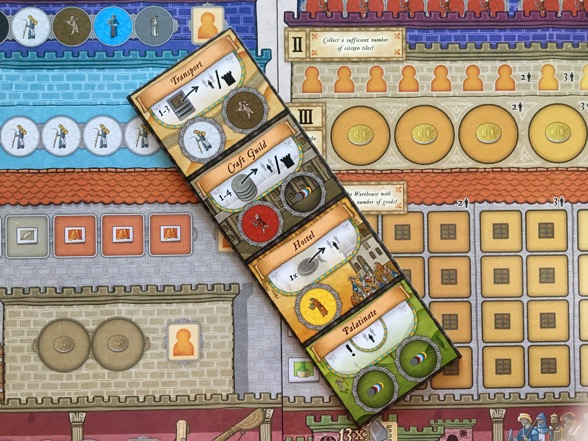
Luckily, each player has access to four new special actions, which allow for new and exciting ways to interact everyone around the table. The Craft Guild, for instance, allows one player to send money to another, and the Hostel allows someone to even send along a follower. Pretty kewl.
As time runs out, the task of fulfilling all these objectives becomes more and more daunting — and yet, tantalizingly within reach. There is real tension in this iteration of the game, and it’s exactly what Orléans needed. Some reviewers say that Invasion is worth purchasing just for “Invasion” alone, and they might not be wrong.
But I’ll go a bit further and say that “The Duel” deserves some love too.
“The Duel” streamlines Orléans into a two-player-only experience (hence “Duel”). Most of the rules are the same: players may embark on their usual base game strategies, but there are a few critical wrinkles in the mix. First, there are four objectives that each player must fulfill, and whoever does so first wins the game. This adds a “race” element into the mix (not “racial,” which would be weird), and that in turn creates tension. You may sense a recurring theme: tension = good. There’s also a smaller beneficial deeds board, which keeps the “Town Hall” action tight and exciting.
But here’s the real rub: “The Duel” forces players to endure a sequence of events that never changes. From game to game, players face the same events in the same order. That may sounds awful, but it works surprisingly well. A random draw of events has unpredictability on its side. A pre-planned sequence, however, has the benefits of knowledge. The game designers know, for instance, what will be most punishing in round 2 versus round 15. And subsequently, players are hit with killer game tasks that make the four simple victory conditions much, much harder to achieve than they should be. Oh, and if you ever fail to fulfill the event obligations, you immediately lose. Difficult, interesting decisions abound.
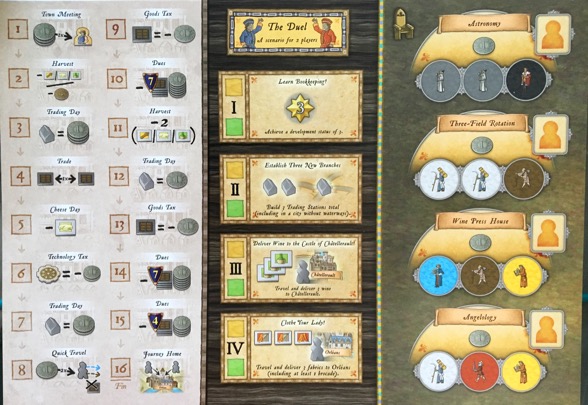
A supplementary board for THE DUEL. Note the various events that happen each round. They look so benign, but they are actually very devilish. Very devilish indeed! Also worth observing: the middle column, whose four objectives must be completed to win.
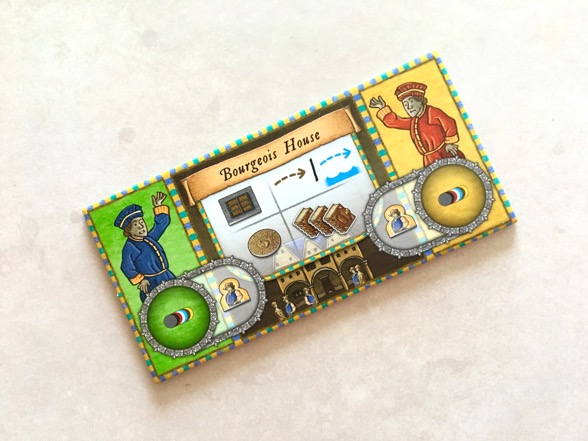
“The Duel” also comes with this added action: The Bourgeois House. This officially makes Orleans: Invasion the most bougie game I own.
For all the ink that’s been spilled about “Invasion,” there’s been little highlighting “The Duel.” This scenario completely tightens up and the game for two players, and while some have lamented that this mode wasn’t really necessary, I say PISH POSH. I’ve played two-player Orléans several times, and this is a significant improvement. I probably would never do 2P without it again.
The third module, “Prosperity,” introduces secret scoring goals and new actions. I’m eager to try it, but honestly, I already know Invasion is worth the money. People who don’t have the base game of Orléans should start there and soak in the fun. Should the experience ever grow thin, Invasion should be the next step. And if your love for the base game never diminishes, Invasion is still worth a gander, if only for the variety it brings. When I get around to “Prosperity,” I’ll come back here and provide some updates. Heck, maybe I’ll even try a solo mode. But for now, rest assured that this expansion offers oodles of bang for its buck with just two modules alone.
